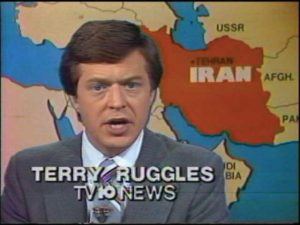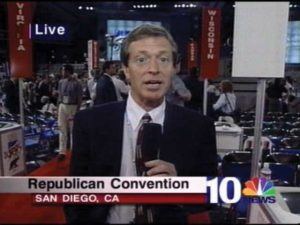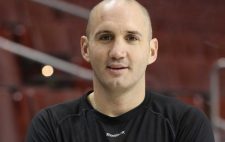Terry Ruggles, 67, greeted us in our living rooms with breaking news stories, light-hearted features and even the weather. He retired in 2012 after 38 years in broadcast news. The Channel 10 fixture met the Pope, traveled the world and brought his own fight with testicular cancer to his viewers. Everyone loved the intrepid reporter from Cherry Hill – well, almost everyone.
Was there someone who was an especially difficult interview?
I was interviewing Cardinal Krol, and he jumped down my throat and said I was the most unprofessional journalist he had ever met. I just wanted to crawl into a hole. I asked him how you shoot the bull with the pope. It was in 1979, and it had been announced that the pope was coming to Philadelphia. There was a last-minute news conference at 4 in the afternoon, and we’re all packed into the archdiocese headquarters. I always try the baseline questions – what does it mean to the lady in her kitchen watching TV. Cardinal Krol was Polish, Pope John Paul II was Polish, and they had served at the College of Cardinals together as fellow Poles, so I wondered, how do you let your hair down with the guy who used to be your friend but now’s the pope? We ended up not talking for four years.
Who was your favorite interview?
I loved [former NJ Governor] Christie Whitman, because she was fun. There would be an interview, but it would happen while I was drinking beer and shooting darts with her at a bar near Princeton. She knew how to be a people’s governor, and I liked that. Rather than standing behind a podium, this lady could give you insight into things in a casual way.
 Can you share a story you covered that affected you?
Can you share a story you covered that affected you?
Three Mile Island was the scariest experience I’ve ever been through, because we didn’t know what was going to happen. The movie “The China Syndrome” was out that year about a nuclear reactor melting down and burning through the earth. Everybody was seeing this thing made in Hollywood, and we didn’t know if it was actually happening in Harrisburg or not. A quarter of the United States lives within a one-day drive of Harrisburg, Pa. The whole world was there – Japanese, English, and German TV, all the networks. We didn’t know if we were going to become victims of it.
You were instrumental in ending a prison hostage situation in Delaware County. Tell us about that.
It was Christmas Eve in the early ’80s, and there were cold drops of icy rain coming down sideways. At the time, I anchored weekends. We got reports that at the Delaware County Prison there was an attempted prison break. We kept calling, and they kept hanging up on us. Sure enough, as soon as we get off the air, they called us and said, “We have a hostage situation, and these people want to talk to a reporter. Do you have anybody that will come down?” Some social workers had gone in and some prisoners had made shivs – sharp objects – out of the metal in the bedding. Two of the social workers were being held as captives. It’s 11:35 Christmas Eve, and it’s raining sideways. Myself and a cameraman go down to the Delaware County Prison, and our gear shorts out because of the rain. I went in, along with police with guns, and told the prisoners to vent to me. I told them, “I’ll make sure the public knows about this.” After about three hours, they stood down, and I got home at dawn on Christmas Day. I got the Pennsylvania Meritorious Citizenship Award that year from the state police.
How did you feel about being part of the story?
I think being part of some stories is a good thing, and the best way to put a signature on a story is if you can somehow be involved. Let’s say you’re doing a story on poor housing conditions. I don’t mean to be an activist to get better housing conditions, but maybe be the reporter who turns on the sink and shows the water is dirty or the reporter who is counting rats scurrying across the floor. I’m a big believer in reporters who become involved to some extent. Not that the story is about them, but they can help tell the story.
How did you get started in broadcasting?
I was lucky enough when I was in high school, I knew what I wanted to do. I grew up in Ohio and went into a radio station in Akron and asked for a job. They said, “Go away kid, you’re bothering us” until I said I’d work for free. Then they found me a job. I went to Ohio State, and I had to work my way through college because I didn’t have any money, so I got a job at a radio station in Columbus that led to a television job. I went into the Army and ran a TV station for the government and then went on to Green Bay and then Grand Rapids. Timing is everything. I was in Grand Rapids when they had a congressman named Ford, and we had a president named Nixon and a scandal called Watergate. I got a whole lot of publicity from doing stories about Jerry Ford becoming vice president. That led me to Philadelphia in 1974.
 You spent 38 years at the same station, which is highly unusual in this business. Why do you think it worked out that way?
You spent 38 years at the same station, which is highly unusual in this business. Why do you think it worked out that way?
Philadelphia is the fourth-largest television market, so it pays a decent dollar. It’s also a great news town. We’ve got the Shore, mountains, corruption, police, educational and medical stories. That was rewarding. I wore a lot of different hats. My first nine years here I was the New Jersey reporter. I was weekend anchorman for a while, the weatherman for five years, and I did science and environmental reporting.
I was knocked down a few times. When they took me off weekend anchoring I was crushed. But then you realize we’re all just small cogs and as journalists, we’re not as big a deal as we think we are. I realized what I wanted was consistency for my wife who had a job and for my kids who were in school, and I was still making a decent dollar. My three most important things in life are family, family, family.
The way news is delivered has changed dramatically during your tenure, along with viewer habits. How did you adapt?
There have been so many changes. We went from film to videotape to digital. The downside of that is there’s no time now for reflection. You don’t have time to edit your thoughts or your script, because there’s this demand to have instant news and this contest to be first. Sometimes people forget about the requirement to be accurate, which is the main mission in the first place. I’m not a big Twitter or Facebook fan. If I have to worry about all those things, am I going to miss the action of the news event? If I’m at a press conference trying to tweet what someone just said, am I missing what they’re saying next?
How did you know that the time was right to retire?
Twelve-hour days. When I got here, we had a noon, 6 and 11 newscast. Now, if you turn on any station, news is almost 24/7 – 4:30 in the morning till 7, 11 in the morning till noon, 4 until 6:30 and 11 until whenever. At the same time, there are other requirements to put it on the web. It got to be in the last year that I was leaving the house at 7 in the morning and coming home at 8 at night. It got physically tiring.
What are you doing now?
I love getting involved with community things. I spent 38 years making the news, and now I can make a difference. I’m on the board of directors of the Cathedral Kitchen of Camden, the Firemen’s Museum, and Smith Playground and Playhouse in Fairmount Park. I’m also involved with Our Community Salutes and a homeowner’s association. I wake up in the morning and rather than worry about the news, I worry about these things. I also play the piano. My daughter took piano and she got bored. My wife took piano and ran out of time, and we had this baby grand in the living room and I said, “I’ve got time to learn how to play this!” I’m hoping that it keeps my mind sharp.












